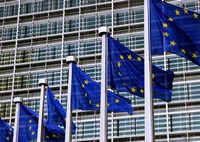-

Reccia: Russia and Ukraine: Nothing Good Lies Ahead?
February 26, 2020
Writing in Global Risk Insights, Frederica Reccia explains the political landscape Ukraine and Russia leaders face in relation to resolution of their protracted conflict in Eastern Ukraine.
-

Pompeo and Foreign Partners Condemn Russian Cyberattack on Republic of Georgia
February 25, 2020
According to The Hill, Secretary of State Mike Pompeo, along with top foreign officials from almost a dozen other nations, condemned a major Russian cyberattack on the country of Georgia that significantly disrupted operations across government and media organizations.
-

Politico: German Hate Speech Crackdown Sparks Censorship Fears
February 25, 2020
According to Politico, As Germany cracks down on hate speech online amid a rise in right-wing extremism, critics warn that civil liberties will end up as collateral damage.
-

Central European Mayors Seek Direct Line to EU Funding
February 12, 2020
According to Politico, to thwart populist leaders in their countries, four Central European mayors are pursuing an end-around national governments in securing EU funds.
-

UK Backs New Regulatory Powers to Rein in Big Tech
February 12, 2020
According to Politico, under proposals to combat online harms, companies could be fined and employees could face criminal charges if they fail to combat online illegal content.
-

Politico: Resignation of CDU Party Leader Throws Germany Politics into Disarray
February 11, 2020
According to Politico, the decision of Angela Merkel’s heir apparent, Annegret Kramp-Karrenbauer, to quit as leader of Germany’s largest party thrust the country’s politics into disarray, reigniting both the race to inherit the chancellor’s mantle and a battle over the direction of the conservative establishment.
-

Walt: Europe's Post-Brexit Future "Is Looking Scary"
February 07, 2020
In a Foreign Policy analysis, Stephen Walt opines about Europe's post-Brexit future, explaining how an aging population, budgetary and national sovereignty constraints on taking hard power foreign policy positions, and the structural shortcomings of the EU pose challenges.
-

CFR's Masters: "Ukraine: Conflict at the Crossroads of Europe and Russia"
February 07, 2020
Jonathan Masters has authored a Council on Foreign Relations Backgrounder: "Ukraine: Conflict at the Crossroads of Europe and Russia."
-

Politico: Minister Says Poland wants to go beyond EU on 5G security
February 07, 2020
Poland plans to restrict "high-risk" 5G telecom vendors in ways that go beyond a series of security controls proposed by the European Union.
-

Commercial Digital Ecosystem Continues to Transform Political Campaigns
January 29, 2020
In a Center for Digital Democracy paper, Kathryn Montgomery and Jeff Chester provide an “early warning system” relating to the manner in which the commercial digital media and marketing ecosystem is now transforming the ways in which political campaigns engage with citizens.
Copyright 2025 Global Governance Watch. All Rights Reserved.
A project of The Federalist Society for Law & Public Policy Studies